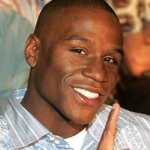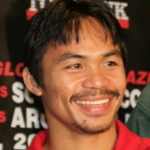
|
Philippines, 28 Feb 2026 |
Home >> News |
 |
||||
|
|
|
|
DWARFING IN THE TWILIGHT: MAYWEATHER VS. PACQUIAO BATTLING OVER MARKET SEGMENTATION By Granville Ampong PhilBoxing.com Thu, 12 Nov 2009   LAS VEGAS, Nevada, Novermber 13, 2009 - I have not come to the grip in matters of understanding the run-through of Top Rank, Golden Boy and Magna Media International's way of handling their marketing strategies affecting Manny Pacquiao's boxing events. Nor have I been present in corporate conferences of their respective advertising strategists. But, let me share with you the perspective of a layman in the understanding of boxers' rising popularity. A case in point is all about Pacquiao's imminence to become a household name in the U.S. and his explosive, even rising popularity over Floyd Mayweather, Jr.'s prominence in penetrating the American market. And this, I hope, should suffice one's appetite for learning, much more in the debates of the sweet science of boxing as to whether Floyd Mayweather, Jr. really still reigns as the Pound-for-Pound king of boxing. Let us start with the statistical breakdown of my premise from recent survey, which is done every five years by the United States Bureau of Census. The U.S. population's distribution by race and ethnicity in 2006 was as follows: Total population: 299 million Please scroll down to read remainder of this article.
Disparity of Entries in Weight Classes versus Market Penetration and Segmentation: Where was Manny Pacquiao during the high tide of Mayweather's popularity in the U.S.? For one thing, Mayweather launched his first professional fight at 130 pounds in 1996 a few months before he turned 20 while Pacquiao fought his first professional debut in the Philippines at 107 pounds just when he was about to turn 17 in 1995. And while Floyd Mayweather, Jr. won his first championship belt (WBC Super Featherweight), from Gerraro Hernandez in 1998 after the latter's fifth title defense at 130 pounds in the U.S., Manny Pacquiao also won in the same year his first world title, WBC Flyweight belt, of which he slugged it out from Chatchai Sasakul via TKO in round 8 at 112 pounds in Thailand. Then, after losing the same title in 1999 to Medgoen Singsurat by TKO in round 3, Pacquiao went on to fight for the WBC International Super Bantamweight title against Reynante Jamili and won TKO in round 2. So, you would see during which time Mayweather was already soaking the American market even before he won the National Golden Gloves Light Flyweight Champion in 1993 on his way to winning the Featherweight Bronze Medal for the U.S. at the Olympics in Atlanta in 1996 while, indeed, Pacquiao was just soaking the Asian market outside of the U.S. and literally has not touched the American market not until in 2001. And so Pacquiao fought thereafter five defenses before he launched his first U.S. debut against Lehlohonolo Ledwaba in 2001 and won the IBF Super Bantamweight title at 122 pounds via brutal knockout in the sixth, during which time Mayweather had just snatched the WBC Super Featherweight Championship belt from Diego Corrales at 130 pounds by TKO in round 10. Now, think about the demographics of the U.S. from 2006, at least roughly with minimal margin of errors as to the historical percentages by ethnicity . Other than Caucasians and Latinos, African-American remains the dominant race in the sports arenas through which Mayweather's name has attained an almost perfect "name-recall" in every family of African descent, free-riding over the infamous black boxers such as Muhammed Ali, Joe Frazer, George Forman, Sugar Ray Leonard and Mike Tyson, notwithstanding retired British boxer and undisputed World Heavyweight Champion Lennox Lewis who eventually migrated to the United States. Banking on those 2006 statistical data, matching Mayweather with any of the famous Mexican boxers such as Manuel Marquez or Julio Ceasar Chavez, Jr. would bring a deeper awakening penetration at a greater percentage of the Latino's 44.3 million population in the United States. Yes, despite Mayweather's flawless professional record of forty fights, he is by far seen as the reigning "controversial boxing" hero in the African-American community, which has an explosive population of 40. 9 million in the U.S., according to the United States Bureau of Census' statistical survey in 2006. Consider this: Matching a superstar fighter from one of the top ethnic group with another would only need to sway 3% of their respective ethnic population to make the fight a blockbuster. You see, Mayweather would only need to "soak the beans" over a few nights to get his own turf's attention despite his behavioral issues. In fact, he only needs to verbalize a few nasty words to get under the skin of the Latinos, to stimulate tremendous market demand from such segment. And all the Latino fans can hopelessly hope for is to see Mayweather getting knock out by a Latino boxer, as in the case of Mayweather vs. Marquez. The prospect of jubilance is what they yearn for, all because of that magnifying power of "La Raza"... that sense of pride, that state of deprivation in uplifting the ego of the psyche of a "Me-xi-ca-no". And Mayweather does not need to know the psychology of this game. In fact, that is deeply embedded in his own fiber. But, as for Pacquiao, it is the rare force of nature in him that really spells out the difference. His God-given ability to capture the hearts of the boxing fans called "charisma" and his willful, unrelenting drive to fight to the end inclusive of his increasing knockout power...all make a compelling, total package of an inspirational fighter, notwithstanding his simple, humble words he speaks status-post each of his fight. On one hand, targeting a specific range of marketing niche is not an easy game for many local fighters, too. And how much more for a foreign fighter whose last name was unknown to the general boxing public in 2001, which may somehow qualify for insertion as a text in the tongue twister of "Peter Piper picked a peck of pickled peppers..." by Mother Goose, that which some Americans even mispronounce it, "Pac-U", or at least such last name, "Pacquiao", cannot easily sink down in the "molecules" of the American brains? Never forget: Pacquiao is reaching his target market in a seemingly wider range, even at grander scale, as manifested on the front cover of Time Magazine and his appearances in hot TV shows in the U.S., breaking the walls of cultural and racial indifference. And it's true, Pacquiao has his genuine fans in every ethnic group, symbolic of a phenomenal metamorphosis of his international appeal to this racially divided land of milk and honey. But, as for Mayweather to determine whether he still captures the hearts of his African-American community and even the quasi ones, one really does not need legal jargons to win arguments over the said issue at hand. He is still well-loved as Pretty Boy, even to the point spoiling his conduct of unbecoming a respectable man in the public eye. Meanwhile, the fact that Pacquiao has penetrated the American market even unto the halls of Hollywood celebrities makes him phenomenal than Mayweather's egotistical, much less paradoxical, mythical command that he claims. After all, it only needs the layman's view to distinguish these two fighters, whether one is for pay-per-view sales or for the interest of the boxing fans. This Saturday, November 14, Pacquiao versus Cotto may find it a bit difficult to get one million PPV sales. Such day is void of any national day for both countries: Puerto Rico and Philippines. And there is commonality here between these two roots: Puerto Ricans and Filipinos are likely to watch "Fire Power" in a party of at least seven in a family, plus friends. Cotto versus Pacquiao would be in no way at par to pull out better, if such fight depends only from these two ethnic groups. But, Pacquiao has gone deeper penetrating the mainstream America regardless of ethnic backgrounds. As retired U.S. lawyer William Jasper said, "Manny Pacquiao has got what it takes to recapture the American hearts into sweet science of boxing." Unlike Mayweather's magnitism, Pacquiao's phenomenal appeal in view of market segmentation should not be studied in the pre-text of the U.S. demographics but in the context of international scene simply because he is a foreign fighter with increasingly broader base of American and trans-racial fans than what Mayweather has, so to speak. Conversely, one of the reasons why Mayweather vs. Marquez generated over a million PPV sales is because the strategic focus of the campaign was rather extrinsic in value: the frequently use of the name of Pacquiao in any interview or in every HBO's 24/7 episode, to stimulate interests from the boxing public and to elicit its buying power even for an unmerited spending. As of this writing, the public eye in the world of boxing sees Pacquiao has that innate power and distinctive ability to defeat, if not knock out, Mayweather in the ring of violence. But, does Pacquiao really need Mayweather at this stage of his career? In other words, is Mayweather still indispensable for Pacquiao's glory? Note: To send your comment(s), please e-mail to granvilleampong@maharlikantimes.com. Click here to view a list of other articles written by Granville Ampong. |
|
||||||||||||||||||||||||||||||||||||||
|
PhilBoxing.com has been created to support every aspiring Filipino boxer and the Philippine boxing scene in general. Please send comments to feedback@philboxing.com |
PRIVATE POLICY | LEGAL DISCLAIMER
developed and maintained by dong secuya © 2026 philboxing.com. |